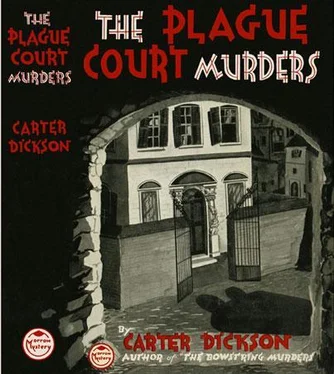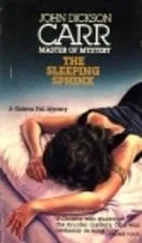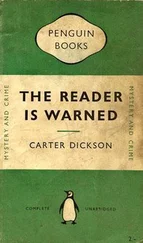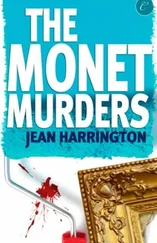Up in H.M.'s office I found a different scene. H.M., who had neglected to put on a necktie that day, was piled into his usual chair with his feet on the desk, sleepily smoking a cigar. Masters was glowering out of the window.
"There's news," I said, "and it may be big news. Look here, through sheer chance last night I discovered who Mrs…."
H.M. took the cigar out of his mouth.
"Son," he observed, squinting down it through his big spectacles, "if you're about to tell us what I think you are, then I must warn you you're goin' to be murderously assaulted. By Inspector Humphrey Masters. Eh, Masters? The French they are a funny race. Burn me, but it appalls the Anglo-Saxon mind how you can print slap out in a Frog newspaper things that'd get you in a libel-suit if you whispered 'em in this room." He waved a paper. " Voici `l'Intransigeant,' mon tres cher panier de salade. Ecoutez. 'LE MYSTERE DE PLAGUE COURT. UNE PROBLEMS FORMIDABLE! MAIS RIEN NEST DIFFICILE POUR NOTRE CHEF DE SURETE, M. LAVOISIER GEORGES DURRAND!' Nous aeons l'honneur de vous presenter" ---"Want to hear it?" inquired H.M., leering. "Public official has a cut at solving the thing. Y'see, the whole trouble is this. . .
A buzzer sounded at his desk. He pressed another, took his feet off the desk, and his whole expression changed.
"To your posts," he said. "Lady Benning is on her way up."
Masters turned round sharply. "Lady Benning? What's she want?"
"I think she wants to accuse somebody of murder," said H.M.
Nobody spoke. Smoky sunlight lay on the frayed rug, and dust motes moved in it. But the mere pronouncing of that name, Lady Benning, had somehow put a chill on us. She was here and everywhere; unseen, but a presence.
During what seemed like minutes we waited. Then we heard a tap on the staircase out in the hall; a pause, then another tap. She had condescended at last to use a cane. I remembered the purple touring-car parked in the street, and who must have been watching as those others went past in uproarious happiness.... The tapping came on....
Your first impression was pity; not altogether for the infirmity. Masters opened the door for her, and she came in smiling. On the night before last you might have guessed her age as sixty; now you could have added many more years. The Watteau marquise was still there, in her way; yet now she had bedaubed it too much with rouge, lip-salve, and rather unsteady eyebrow-penciling. The eyes were brilliantly alive, and they smiled and roved.
"So you are all here, gentlemen," she said, in a voice that cracked slightly and raised in the scale. She made a delicate attempt at clearing her throat. "That is good. That is very good. And may I sit down? Thank you so much." She nodded her large hat, under which the waves of the white hair curved, and it shadowed the wrinkles. "I have heard my late husband speak of you, Sir Henry. So good of you to allow me to see you."
"Well, ma'am?" said H.M.
He spoke sharply, with the deliberate intent of rousing her; but, as she only smiled and blinked, he prompted:
"You said that you had a communication of some sort you wished to make?"
"Dear Sir Henry. And you-and you-" After a pause she took one hand off her cane and put her fingers gently on his desk. "Are you all blind?"
"Blind, ma'am?"
"Do you mean that clever men like you - and you - haven't seen? Must I tell you? Do you really mean that you don't know why dear Theodore left town and rushed away to his mother in that mad hurry? Either out of fear, or in case he should have to tell what he might not wish to tell? Don't you know what he guessed, and now he knows?"
H.M.'s dull eyes flickered open. She leaned abruptly towards him. Her voice was still low, but it was as though another of Darworth's ghoulish toys say a fantastic, unholy jack-in-the-box-had snapped open.
"That Marion Latimer is mad," said Lady Benning.
Silence....
"Oh, I know!" She spoke more sharply, and peered at us. "I know how you would be deceived. You think that because a girl is young, and pretty, and can laugh at your man's jokes, and goes swimming and diving and playing tennis on two strong legs, that there can't be any maggot up here. Don't you? Don't you?" she demanded, and her glance flickered round again. "You wouldn't hesitate to believe it of me, though. And why? Because I am old, and because I believe things you are simply too blind to see. That's why; that's the only reason.
"All the Melishes are rotten with insanity. I could have told you that. Sara Melish, that girl's mother, is kept under observation in Edinburgh.... But if you won't believe what I tell you, won't you believe plain evidence?"
"Humph. Such as-?"
"The voice in Ted's room that morning!" She apparently caught some expression on H.M.'s face, for she kept smiling and nodding. "Why did you all so easily assume it was an outsider? Was it likely that an outsider should be on the balcony at that hour of the morning? But, you see, the balcony runs all around the house: past dear Marion's bedroom.... But was it a wonder that a poor kitchen-maid was deceived in the voice? Dear Sir Henry, she had never heard it before-speaking in that manner. That was the dear girl's real voice. What else can one make of the words, `You never suspected it, did you?"
I heard hard breathing behind me. Masters lumbered past and up to H.M.'s desk.
"Ma'am," he said, "ma'am"
"Shut up, Masters," said H.M. softly.
"And that dear gullible police-sergeant of yours, that Mr. McDonnell you sent to spy on us before," continued Lady Benning, lifting and lowering her fingers on the desk. Her painted face moved snakily around. "He called on poor Marion at an inconvenient hour yesterday afternoon. She got rid of him - oh, so easily, the dear clever girl! She had to go out. Oh, yes. She had other work to do."
Lady Benning giggled. Then her head jerked up.
"I believe the inquest is to be held this afternoon, Sir Henry. I shall perform my duty. I shall go into the box and accuse poor Marion of the murder of Roger Darworth and of Joseph Dennis."
The silence after those sharply enunciated words was broken by H.M:'s thoughtful voice: "Now, ma'am, that's most interestin'. You won't be able to do, it this afternoon, of course; I forgot to tell you there's been an adjournment---"
She leaned again. It was like a pounce. "Ah! You believe me, don't you? I can see it in your face. Dear Sir Henry... . "
"But it's interestin'. It shows rather a change of attitude, don't it? I wasn't there, and all I know is what I read, but didn't you say Darworth had got himself done in by ghosts?"
Her little eye gleamed like a crumb of glass. Say that, and you touch the fanatic. "Make no mistake, my friend. If they had chosen to kill Mr. Darworth- "
There was a late and somnolent fly drumming along the edge of H.M.'s desk. Her black-gloved hand shot out. The next moment she brushed the dead thing softly to the carpet; then she dusted her hands together, smiled at H.M., and went on evenly: "That is why I supposed it, you see. But when the unfortunate imbecile was murdered, I knew that they had only stood by in their power, and watched a human being commit these murders. In a way, it was their direction. Oh, yes. They were instrumental. But they chose a human agent." Slowly she lifted herself across his desk; and, leaning nearly in his face, scrutinized H.M. with a hideous earnestness. "You do believe me? You do believe me, don't you?"
H.M. rubbed his forehead. "It seems to me, now that I remember it, something about Miss Latimer and Halliday holdin' hands. . .
She was a wise general. She knew the value of not saying too much; she knew the value of her effects. After carefully watching H.M.'s face-and, in general, card-players have found this a highly unprofitable proceeding - she seemed satisfied. There was a thin frosty light of triumph about her. She got to her feet, and so did H.M. and I.
Читать дальше









